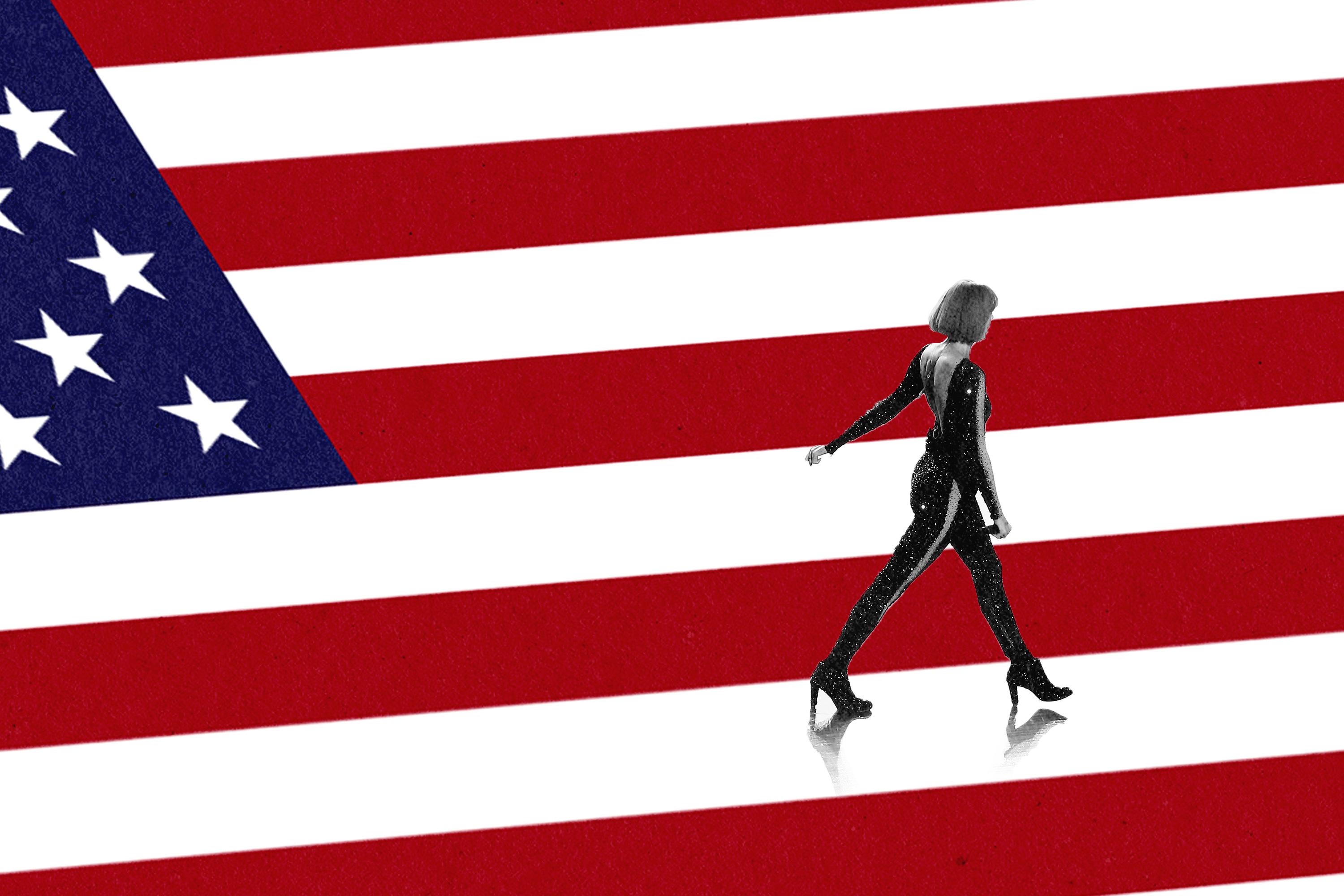Blank Space: Taylor Will Not—and Should Not—Solve Your Donald Trump Anxiety
It has become fashionable to demand that Swift denounce Donald Trump, or at least make her leanings plain. But that kind of celebrity politics is what got us here in the first place.
The public doesn’t know what Taylor Swift thinks about Donald Trump. She never talks, sings, or tweets about Trump, nor has Swift shared her thoughts about Charlottesville, the transgender military ban, or the overall rise of Nazism in the national political landscape. At the VMAs this past weekend, Swift hogged the screen for five minutes to premiere a cheap music video without saying anything about—all together now—this fraught political climate.
For more than a year now, Swift’s critics have pestered the pop star about her politics, with a specific interest in her take on Trump. Following the October 2016 release of the infamous Access Hollywood recording of Trump bragging about grabbing women “by the pussy,” journalist Kelsey McKinney called on Swift to make good on her claims to “a feminist stance.” “Taylor Swift does not owe anyone her opinion on Trump, or racism, or anything,” McKinney wrote. “But silence is not an apolitical action, as much as Swift seems to suggest that it is. To remain silent is to remain complicit—a choice that’s all the more egregious in light of Swift’s enormous platform.” It is a sentiment that has gained traction in the weeks and months since Swift endorsed the Women’s March, without attending, in January, and critics have begun to interpret her political closure as self-obsession.
“Particularly selfish about Reputation’s rollout is that … many artists on all levels have come out to champion pressing causes and effect positive social change,” writes Dan Ozzi for Noisey. “The front was so united against Trump that he had a miserable time finding people who would perform at his inauguration and eventually had to settle for wash-ups like Three Doors Down. But now that momentum is being eclipsed by the cloud of toxic smoke emanating from Swift Industries.” Two weeks ago, The Daily Beast cited neo-Nazi fan theories about Swift’s heritage and political inclinations as reason enough for Swift to finally take a stand against the insurgent white nationalist movement in this country. “If you don’t happen to be rocking a Fred Perry polo and holding a tiki torch your buddy Cole picked up for you at Party City and/or the president of the United States,” Amy Zimmerman wrote, “you should have no problem condemning Nazism.”
Swift could immediately clear all this up if she just succumbed to media pressure and publicly denounced the president, and his extreme supporters, once and for all. It is clear that such a declaration would thrill very many liberal Swift fans. But it’s unclear what Swift’s political liberation would accomplish apart from personal validation by association. It’s worth noting here that Hillary Clinton lost the 2016 presidential election days after her campaign threw spectacular rallies starring LeBron James, Beyoncé, Jay-Z, Katy Perry, and others. So much for star power. Still, Swift’s political silence is remarkable if only because speaking out would put her in decent company among modern pop stars who broadcast their political affiliations without reservation. In a year when her rival Katy Perry has rushed into political sincerity with all the grace of Wile E. Coyote, Swift has simply remained silent. Unaligned, she persists.
There is no good reason to care what Swift or Perry, who both make self-obsessive pop songs for a living, think about politics. It’s worthwhile to interrogate the politics of their art (though the prospect of these artists making all their subtext and biases plain as press release language strikes me as, well, artless). And it’s reasonable to expect that they should be as opinionated, vocal, and active as anyone else. But it is troubling when we begin to take pop stars especially seriously, not because they have demonstrated knowledge or competence but simply because they command massive audiences. It is the first step toward some much larger problems.
Still, Swift’s critics will not let up. At a time when civic life is often reduced to an infinite series of Twitter threads, the uncertainty surrounding Taylor Swift’s political convictions isn’t just some bit of celebrity intrigue; it is somehow a full-blown crisis of the American political imagination. If Taylor Swift declines to reveal her partisan allegiances and her political priorities, how will teenagers ever come to know right from wrong? At moments like this, it feels like the same Resistance that tasked itself with opposing Donald Trump is succumbing to the frivolous celebrity worship that helped install him.
Of course, the American political imagination has already met its dead end of celebrification in Donald Trump himself, a TV star whose politics came as the worst sort of surprise to your average fan of The Apprentice, Home Alone 2, and the “On Our Own” music video. Trump is not the first famous entertainer to reach high office, but he is the hyper-absurd terminus of a lineage that includes Ronald Reagan, Jesse Ventura, and Al Franken. Running and holding office has always been its own genre of theatrics, but Trump distinguishes himself from his celebrity-politician predecessors by refusing to step decisively from one genre (commercial entertainment) to the next (public office). Instead, Trump scrambles both realms together into a chaotic nonfiction where everything is fake but the consequences of his actions. The news media invited this distortion: Every time CNN or Good Morning America solicited Donald Trump’s theories about Barack Obama’s birth certificate, the distinction between politics and entertainment blurred further. Trump exploited our faltering perception by keeping us all entertained, and by volunteering his every last, half-assed, deplorable take on politics. The media dismissed Trump as “a little ridiculous” while simultaneously asking the nation to hear him out. And so Trump leveraged name recognition—which is a relatively senseless achievement, at least in his case—into credibility and, then, power.
Which brings us back to Swift, whose blank political canvas has become the latest treacherous frontier for this dystopian kayfabe republic. Writing for Vulture on Wednesday, Mark Harris described Swift’s new single, “Look What You Made Me Do,” as a bratty anthem for the petulant and blameless, a lesson in modern presidential politics. “Whether or not she is a Trump supporter,” Harris wrote, “she is an embodiment of Trump culture.” Swift and Trump are similar in some basic, behavioral ways—they perform, they’re petty, they like gold, they’re both (close to) blonde—but they are mainly comparable as two celebrities whose political credibility the media has spun from thin air. There’s no longer any meaningful distinction between their professions; they are both qualified, in a sense, to do it all. Modern politics invites us to think of Taylor Swift, the singer, and Donald Trump, the president, in similar terms, comparable to one another in credibility and talents. In this dismal paradigm, critics—and, terrifyingly, the public they serve—make no distinctions between a politician’s platform and a pop star’s platform. They lose all sense of the difference between civic life and fandom. That’s the dead end. That’s the trap.
There’s still time, I think—I hope—for us to consciously uncouple politics and entertainment. Ideally, the pop star Taylor Swift will resist all calls for political conversion indefinitely, if only to frustrate the dangerous, pathological conflation of politics and entertainment that Trump has mastered. For whatever it’s worth, Swift was just as politically inaccessible for all of Barack Obama’s two presidential terms. In general, she doesn’t seem to care very much about politics at all. I write “seem” because it’s possible that Taylor Swift does, in fact, care deeply about politics, and maybe she’s much more knowledgeable about health care reform than a pop critic might guess. If Swift voted for Clinton, does it really matter? If she voted for Donald Trump, do you really want to know? Well, of course you do.
Perhaps the better question, then, is: Do you really want to live in a country that breathlessly encourages Taylor Swift to become yet another pundit, and perhaps an easy clickbait candidate for office some day? In such a country, a popular NBC game show host who is wildly unqualified for public service, and whose political program is pure entertainment, became president of the United States. Together, the media and the public they serve engineered a political climate despite their better judgment, and the land grew inhospitable. Let’s say we just start over.

